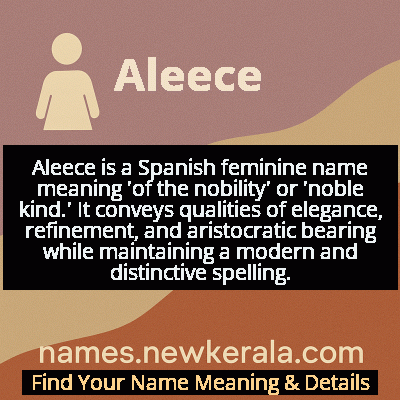Aleece Name Meaning & Details
Origin, Popularity, Numerology Analysis & Name Meaning of Aleece
Discover the origin, meaning, and cultural significance of the name ALEECE. Delve into its historical roots and explore the lasting impact it has had on communities and traditions.
Name
Aleece
Gender
Female
Origin
Spanish
Lucky Number
4
Meaning of the Name - Aleece
Aleece is a Spanish feminine name meaning 'of the nobility' or 'noble kind.' It conveys qualities of elegance, refinement, and aristocratic bearing while maintaining a modern and distinctive spelling.
Aleece - Complete Numerology Analysis
Your Numerology Number
Based on Pythagorean Numerology System
Ruling Planet
Uranus (Rahu)
Positive Nature
Strong sense of order, loyal, practical, and disciplined.
Negative Traits
Stubborn, overly serious, rigid, and prone to feeling restricted.
Lucky Colours
Blue, gray.
Lucky Days
Saturday.
Lucky Stones
Blue sapphire.
Harmony Numbers
1, 7, 8.
Best Suited Professions
Managers, engineers, accountants, organizers.
What People Like About You
Dependability, discipline, practicality.
Famous People Named Aleece
Aleece Morgan
Musician
Lead vocalist of indie folk band with international recognition
Aleece Burgos
Visual Artist
Contemporary painter known for blending Spanish cultural motifs with modern abstract expressionism
Aleece Rodriguez
Educator
Founder of bilingual education programs in Spanish-speaking communities
Aleece Santos
Fashion Designer
Innovator in sustainable fashion with Spanish textile traditions
Name Variations & International Equivalents
Click on blue names to explore their detailed meanings. Gray names with will be available soon.
Cultural & Historical Significance
In contemporary Spanish-speaking cultures, Aleece maintains its connection to elegance and refinement while adapting to modern naming trends. The name bridges traditional Spanish naming conventions with contemporary international influences, reflecting the evolving nature of Hispanic identity in a globalized world. It represents a fusion of historical prestige with modern individuality, making it appealing to parents who value both cultural heritage and unique personal expression.
The name's persistence across generations demonstrates the enduring value placed on qualities of nobility and refinement within Spanish culture. While the spelling 'Aleece' represents a more recent innovation, it continues to honor the cultural legacy of its traditional counterparts, serving as a testament to the dynamic nature of Spanish naming traditions in the modern era.
Extended Personality Analysis
Women named Aleece are often perceived as possessing natural grace and intellectual curiosity. They tend to exhibit refined manners and a sophisticated approach to life, combined with strong leadership qualities and innate dignity. Their noble namesake seems to manifest in their character through a natural authority and poise that commands respect in both personal and professional settings. They are typically well-spoken, culturally aware, and possess an appreciation for beauty and tradition.
Aleece typically demonstrates excellent communication skills and cultural awareness, often showing particular aptitude for languages and the arts. They are known for their loyalty to family and tradition while maintaining progressive views. Their personality balances traditional values with modern sensibilities, making them effective bridges between generations and cultures. They often excel in roles requiring diplomacy, education, or creative expression. The combination of their innate elegance and intellectual depth makes them particularly effective in positions of influence and mentorship.
Despite their refined nature, those named Aleece are often approachable and empathetic, using their natural authority to uplift others rather than dominate. They tend to be lifelong learners with a particular interest in cultural studies, history, and the arts. Their strength lies in their ability to maintain personal integrity while adapting to changing circumstances, making them resilient and respected figures in their communities.
Modern Usage & Popularity
Aleece has emerged as a distinctive modern variation of traditional Spanish names, gaining popularity among parents seeking unique yet culturally grounded names. While not among the most common names in Spanish-speaking countries, it has seen steady usage in cosmopolitan areas and among diaspora communities. The name appeals particularly to families who appreciate its noble connotations but desire a less common spelling that distinguishes their child while maintaining cultural authenticity. Its usage reflects contemporary trends toward name personalization while maintaining cultural connections, with moderate popularity in the United States, Spain, and Latin American urban centers where traditional and modern influences intersect.
Symbolic & Spiritual Meanings
Symbolically, Aleece represents nobility of character rather than just aristocratic lineage. It embodies the ideals of grace under pressure, intellectual refinement, and moral integrity. The name carries connotations of leadership combined with compassion, suggesting someone who leads through wisdom rather than authority. In metaphorical terms, it symbolizes the bridge between tradition and innovation, heritage and individuality. The name suggests a person who carries themselves with dignity while remaining accessible and empathetic to others, representing the ideal of enlightened leadership in modern society. It also symbolizes cultural continuity and the elegant evolution of traditions across generations.

